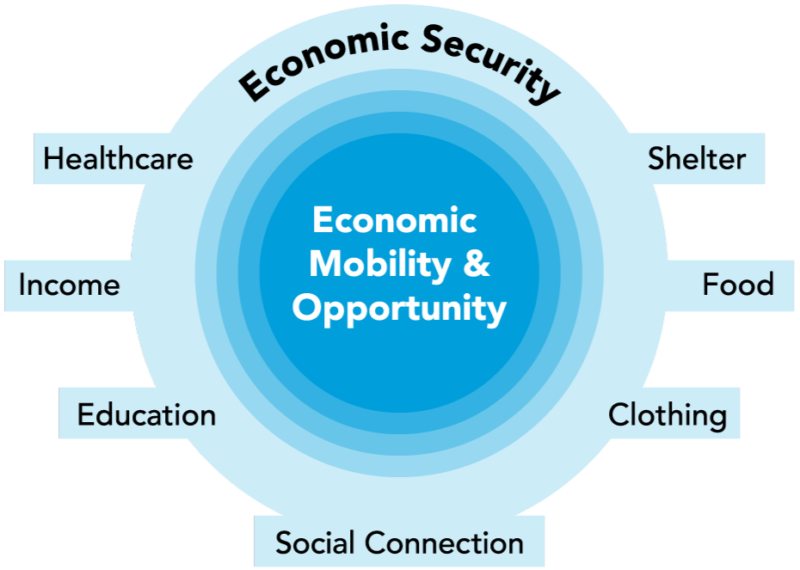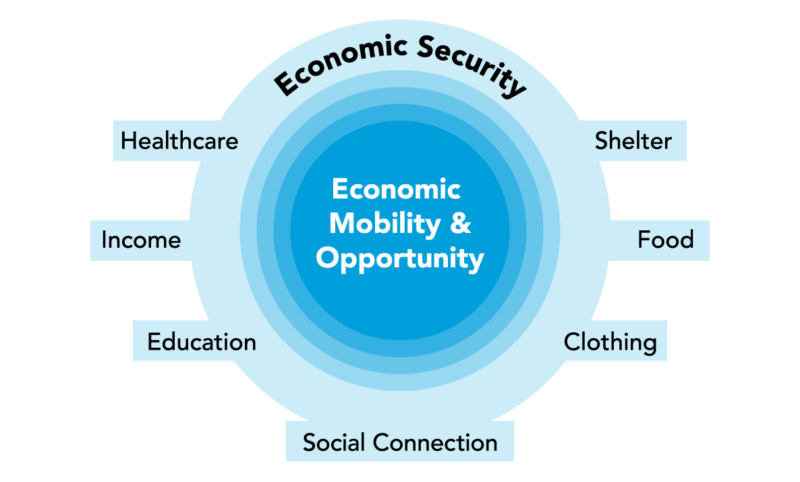At Jewish Family Service we recognize income as a fundamental and critical social determinant of health.
The degree to which we can provide for our most urgent and basic needs including rent, education, food, childcare, and healthcare expenses is directly attributable to our overall health and well-being.
For Black, Indigenous, People of Color, low-income and differently-abled communities in particular, disparities in wealth, social capital, and other resources hamper the ability to achieve the economic security necessary to thrive.
Historical disinvestment in these communities, racism, gender discrimination, and occupational segregation are some of the root causes of the income and wealth disparities we see today. In an era where the global COVID-19 pandemic has shaken the foundation of our economy and reshaped our ideas about the workforce — we are revisioning a social safety net that helps the most impacted communities recover and improves our collective health and well-being.

At Jewish Family Service we recognize income as a fundamental and critical social determinant of health.
The degree to which we can provide for our most urgent and basic needs including rent, education, food, childcare, and healthcare expenses is directly attributable to our overall health and well-being.
For Black, Indigenous, People of Color, low-income and differently-abled communities in particular, disparities in wealth, social capital, and other resources hamper the ability to achieve the economic security necessary to thrive.
Historical disinvestment in these communities, racism, gender discrimination, and occupational segregation are some of the root causes of the income and wealth disparities we see today. In an era where the global COVID-19 pandemic has shaken the foundation of our economy and reshaped our ideas about the workforce — we are revisioning a social safety net that helps the most impacted communities recover and improves our collective health and well-being.

The JFS Economic Mobility and Opportunity team leads innovative projects such as San Diego County’s first guaranteed income program — the San Diego for Every Child Guaranteed Income Project (SDEC GIP) — as well as the Family Income for Empowerment Program, the Recovery Action Fund for Tomorrow (RAFT), and the Black Women’s Resilience Project. We design programs that address the root causes of poverty and socioeconomic disparities. Initiatives under Economic Mobility and Opportunity identify gaps and opportunities to develop targeted approaches and solutions that improve outcomes for families agency-wide. The primary goal of this work is to craft a cohesive regional narrative about the equitable redistribution of power through strategies such as flexible financial investments in families, like guaranteed income, targeted community-driven programming, and power-building in policy and practice for governmental, non-profit, and philanthropic entities alike.


What would you do with an extra $500 a month?
150 San Diegans got a chance to find out in JFS’s San Diego For Every Child Guaranteed Income pilot program.
This program was designed to test a concept called guaranteed income, where people receive monthly payments. Unlike other aid — rent or tuition assistance, utility and food vouchers, or material donations — recipients had full control over how to use this income. One benefit of the pilot: A chance to think, plan, and be proactive.
Featured on the front page of The San Diego Union-Tribune’s Sunday edition, this in-depth report follows Saundra, a single mom of three boys, working multiple jobs and struggling to make ends meet. Read more to learn if Saundra’s family was in a better place after participating:

Khea Pollard
Director of Economic Mobility & Opportunity
Khea Pollard is the Director of San Diego for Every Child. She has several years of experience fostering collaboration, facilitating dialogue, and implementing policy to make improvements in health, human service, and criminal justice systems. Her skills include facilitating interagency communication, generating solution-focused dialogue, project management, and strategic planning.
Prior to joining San Diego for Every Child, Pollard was a Justice Program Manager for the National Association of Counties, serving County governments across the United States. Her work focused on the intersection of behavioral health, criminal justice reform, and racial equity, supporting counties to make evidence-based policy changes, providing trainings, implement quality assurance practices, and facilitate multijurisdictional information sharing to reduce the number of individuals with mental illness in county jails.
Locally, Pollard served as the Health and Human Services Policy Advisor and Community Representative to Supervisor Greg Cox at the County San Diego, advising on issues pertaining to children and youth, education, child welfare, juvenile justice, safety net and eligibility programs, behavioral health, and probation.
She enjoys supporting community-based organizations, currently serving as the Youth Prioritization Mentor for San Diego Youth Will. She has worked on numerous nonprofit consulting projects in the areas of finance, board development, strategic planning, policy, civic engagement, human resources and more. Pollard is also a proud Alumna of the RISE Urban Leadership Fellowship Program and a small business owner.
A native San Diegan, Pollard graduated from the University of San Diego (USD) with a B.A. in English, a B.A. in Ethnic Studies, and a Master’s degree in Nonprofit Leadership and Management.

Jennifer Lopez
Program Coordinator
Jennifer (Jenn) Lopez is a Program Coordinator with the Economic Mobility and Opportunity Department, supporting the guaranteed income and cash transfer programs. She was born and raised in Escondido, CA, and graduated from the University of California, Berkeley with a Bachelor of Arts degree in Sociology and a minor in Ethnic Studies. She is passionate about community empowerment, education, and collective liberation which drives her work and passion for building spaces where communities can flourish and thrive. In the near future, she hopes to go to school to get a Master of Science in Multicultural Community Counseling and Social Justice Education.
Nicholas Seaton
Administrative Analyst
Nicholas Seaton is an Administrative Analyst with the Economic Mobility and Opportunity Department, supporting the guaranteed income and cash transfer programs. He graduated from Point Loma Nazarene University with a Bachelor of Arts degree in Sociology. He is passionate about community outreach and changemaking, as well as research and data modeling. Nick looks forward supporting the expansion and design of future guaranteed income projects. In the future, he plans to go to school to get his Masters in Human Resource Management.
A guaranteed income is a monthly cash payment given directly to families, with no strings attached. Support provided in this way acts as a buffer, providing economic security during economic downturns and can be leveraged as a steppingstone for economic mobility. Direct, unconditional cash give families the freedom to spend money on their most immediate needs whether it be food, childcare, medicine, clothes, diapers, or simply rent.
Pilot programs across the Country, and globally, have proven to reduce poverty and improve overall health and well-being. Meant to complement rather than replace existing safety net programs, guaranteed income pilots have helped fill in gaps left by programs such as CalWORKS/TANF, CalFresh/SNAP and others that are categorical – authorizing only limited types of expenses – difficult to access, and where income eligibility is often too low to catch the true number of families in need.
During times of uncertainty, cash allows for flexibility and is one of the quickest ways to help stabilize families experiencing economic volatility. During the peak of the COVID-19 pandemic, households across the country received direct stimulus payments to help meet their basic needs. Additionally, the federal government moved to expand eligibility and increase the payment amounts for the Child Tax Credit. Where this credit was previously provided annually, it was advanced monthly – as guaranteed income. The U.S. Census Bureau estimates that the impact of these changes to the tax credit reduced childhood poverty by 46 percent since 2020.
In Practice
We hosted community conversations to introduce our programs to our local community. Many expressed that receiving additional income would reduce their stress level and allow them to spend more time with loved ones, and plan for their future. Unconditional, no strings attached direct cash is a way to recognize everyone’s inherent dignity and a step away from merit-based aid. During a recent session, community members were asked how guaranteed income resonates for them. The notes below are what they wrote.

The San Diego for Every Child Guaranteed Income Project (SDEC GIP) provides 150 families within four zip codes in San Diego County. Families receive $500 in monthly cash payments for 24 months.

The goal of the Black Women’s Resilience Project (BWRP) is to support and advance culturally relevant strategies to shift human services delivery models for Black women facing the violence of poverty. Through this program, we seek to understand the racial and ethnic experience of poverty as a social construct, rather than a character deficit, and actively develop solutions to eliminate it.

Recovery Action Fund for Tomorrow (RAFT) will provide one-time cash distributions in the amount of $4,000 to families with children under 18 years of age and seniors, prioritizing those at risk of homelessness. This fund addresses the growing need for flexible funds, will connect recipients to resources that help them maximize the receipt of these funds and will support them in planning for their future.

In partnership with the County of San Diego Health and Human Services Agency’s Child and Family Well-Being Department (CFWB), the Family Income for Empowerment Program (FIEP) will give 485 eligible families with children under 18 referred by CFWB unrestricted monthly cash support of $500 for 24 months. This program will look at how direct, “no strings attached” economic support impacts well-being and strengthens families.
If you have any questions regarding the Jewish Family Service Economic Mobility programs, please contact us at [email protected] or at (858) 637-7350.
What would you do with an extra $500 a month? 150 San Diegans got a chance to find out.
The San Diego Union-Tribune
June 9, 2024
7-Month Mark for San Diego Area’s First Guaranteed Income Project
ABC 10 News
October 4, 2022
Advocates Are Piloting a New Kind of Income Assistance
Voice of San Diego
September 8, 2022
Guaranteed Income Helps Ease Inflation Pressures for San Diego Families
The NBC 7
August 20, 2022
Read Story >>
Different versions can be viewed here